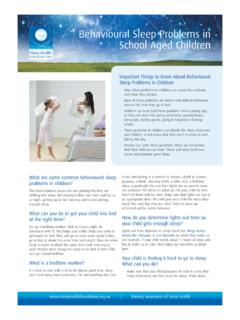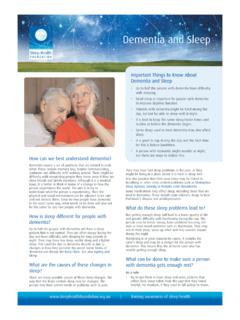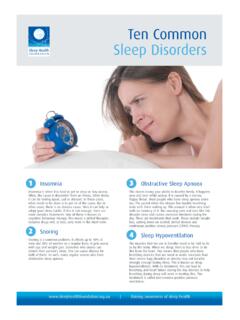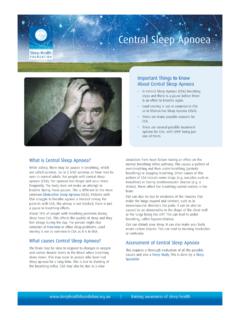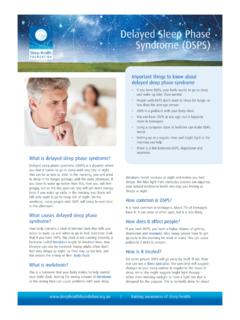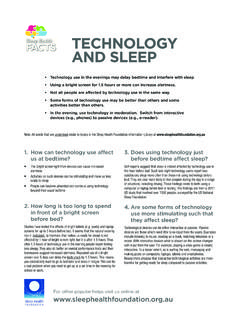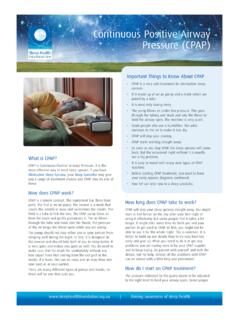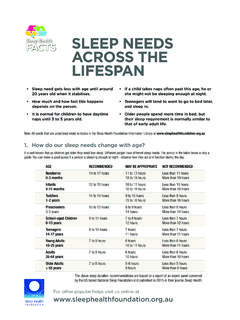Transcription of Behavioural Sleep Problems in School Aged Children
1 Behavioural Sleep Problems inSchool aged | Raising awareness of Sleep healthImportant Things to Know About BehaviouralSleep Problems in Children Most Sleep Problems in Children are caused by problemswith how they behave. Most of these Problems are linked with difficult behaviouraround the time they go to bed. Children can have had these Problems from a young age,or they can start after going on holiday, moving house,being sick, family upsets, going to hospital or startingschool. These Problems in Children can disturb the Sleep of parentsand Children . It will mean that they don't function as wellduring the day. Parents can solve these Problems . There are behavioursthat their Children can learn. These will make bedtimeseasier and promote good are some common Behavioural sleepproblems in Children ?The most common issues are: not getting into bed; notsettling into Sleep ; not staying in their own bed; waking upat night; getting up in the morning and/or not gettingenough Sleep .
2 What can you do to get your child into bedat the right time?Set up a bedtime routine. Stick to it each night. Beconsistent with it. This helps your childs body and mind toget ready for bed. They will go to Sleep more easily if theygo to bed at about the same time each night. They are morelikely to wake at about the same time each morning aswell. Parents must always be ready to be firm if their childacts up around is a bedtime routine?It is best to start with a 30 to 60 minute quiet time. Keepyour child away from computers, TVs and anything else thatis too stimulating. It is normal to include a bath or shower,pyjamas, a drink, cleaning teeth, a toilet visit, a bedtimestory, a goodnight kiss and then lights out as parents leavethe bedroom. Put limits on what you let your child do t let them stall for time. Make sure that lights are out atan appropriate time. This will give your child the Sleep theyneed.
3 The next day they are more likely to wake uprefreshed and be better do you determine lights out time soyour child gets enough Sleep ? Lights out time depends on Sleep need (see Sleep NeedsAcross the Lifespan). It also depends on when they wake example, if your child needs about 11 hours of Sleep andhas to wake up at 7am, then lights out would be at child is finding it hard to go to can you do? Make sure that your child prepares for bed in a way thathelps them relax and feel ready for Sleep . Think aboutSHF-BehaviourProblems-1111 30/11/11 6:07 PM Page 1what should and should not be in the bedroom. Youwant it to be a relaxing place (see Sleep Tips forChildren). Make sure there are no noises that disturb your child ssleep such as TV noise. Make sure your child can switch off their thinking afterlights out. This will make settling into Sleep easier. Youcan teach your child things such as simple breathing orrelaxation exercises.
4 These distract the mind and slow itdown, so Sleep can come. Quiet time with no technologybefore bed time will help. Soft quiet music may alsohelp. Make sure that your child is not going to bed too earlyor too late. Both can make it hard to settle into to be aware of when your child gets sleepy in theevening. This will let you know when the sleepprocesses are starting to kick in. From this you can workout when the best time to go to bed is. Remember, asyour child gets older their switch on for Sleep will be abit later. This means bedtime is a bit later too. Make sure that your child does not grow to need you tohelp them to go to Sleep . They need to learn how tosettle into Sleep alone. (See below).Why does your child keep waking you upduring the night?Your child can naturally wake several times a night. Thesedisturbances last a few seconds to a few minutes. Theyshould be able to self settle back into Sleep .
5 But if yourchild has not learned how to self settle, they may wakeyou or come to your bed to seek your help to go back tosleep. It s worth teaching your child to self settle at thestart of the night. This will help them to be able to selfsettle through the night. You will get a much better night ssleep from can you teach your child to self settleinto Sleep ? To teach them how to do this, you need to go out ofthe room with the lights out. You should do this beforethey are asleep. This gives them the chance to fallasleep with no help from you and when you re not inthe room with them. It usually takes 15 to 20 minutesfor them to fully get to Sleep . Try to avoid doing thingsin or around your child s bedroom during this time. If your child has never gone to Sleep without you,explain to them what is going to happen. Be firm butreassuring to your child about being able to go to sleepwhen you re not in the room.
6 Some Children will get worried about this or try not tolet you leave the room. Some will get out of bed to findyou. In this case you can take things more slowly. Youcan go back into the room on and off, for a short you need to, you can put them back into bed, getthem to lie down and tell them to go to Sleep . Whenthis is done, you leave the room. You may need to dothis over and over. Each time, spend longer and longerout of the room. If you are consistent and stick withthis, then you will succeed. Remember to keep a lid onyour emotions when in the bedroom. Also be as boringas possible. One more thing you can do is to put a stretcher bed ormattress next to your child s bed. Be there, but havevery little interaction with your child. The only thing youshould do is tell them to go to Sleep . Remember thatthis should only be a temporary thing. Once they areused to this they will go to Sleep without being told you should start to gradually get out of thebedroom.
7 It is important that once you start this not togive in. Don't go back to old ways. This will confuseyour child and make it harder the next time you try tochange. You can also use this if they have beensleeping with you and you want to teach them to sleepin their own bed. You might find teaching your child to self settle intosleep is causing distress to you and your child. Or youmight not be sure of what strategies to use. If so, it isrecommended that you seek professional help. Are there other reasons why my child maywake up or stay awake at night?After waking up at night, your child may find it hard to getback to Sleep . This is due to their brain starting to thinkabout things and keeping them awake. Your child may nottell you about this and lay awake in bed for some time. Inthe morning they can be hard to wake or still seem tiredeven though they had enough time in bed to get the sleepthey to ask them in the morning if they had a goodsleep.
8 This lets them tell you if they have any problemswith their Sleep . Help them to learn how to deal with sleepproblems. If necessary, see a Sleep are other reasons why your child might wake up atnight. These include illness, being too hot or cold, hunger,nightmares, and night terrors. These tend to get betterwith time and don t last. To learn how to deal with this seeNightmares andSleep | Raising awareness of Sleep healthSHF-BehaviourProblems-1111 30/11/11 6:08 PM Page 2 What can you do if your child is anxious,is scared of the dark or has night-timefear about bedtime? A small dim night light can help. When your childwakes during the night, having some light helps themwork out where they are and know they are a comfort object to bed, like a teddy bear, canhelp your child not feel so alone at night. Rememberto reassure them that nothing will hurt a baby monitor in their room (linked toyou) will can you help your child to stay intheir own bed?
9 Be consistent and assertive about your child staying intheir own bed. If you do not want them to Sleep inyour bed, always take them back to their own bedwhen they come to your bed. Remember to alwaysremind them that you expect them to stay in theirown bed all night. Build a consistent habit of your child going to Sleep inthe place where your child will Sleep for the night. Itis best if this is their own bed. It can be disturbing forthem to wake up somewhere other than where theyremember going to Sleep . This can make them getout of bed and wake you. Remember to praise your child for successfully stayingin their own bed all night. It can help to have areward system if they behave well at bedtime. Keepthe rewards small and frequent. Stickers often can t deal with your child s sleepingproblem. What can you do?If you are not sure about why your child has a sleepproblem or you can't deal with it, contact your familydoctor or paediatrician.
10 Some Children may need a SleepSpecialist. If you feel your child may have a sleepdisorder, please see the pages on this topic, ChildhoodBehavioural Sleep Problems and Childhood Snoring andSleep can you find more informationabout Children s Sleep ? | Raising awareness of Sleep healthDisclaimer - Information provided here is general in nature and should not be seen as a substitute for professional medical concerns about Sleep or other medical conditions should be discussed with your local doctor. Sleep Health Foundation, 2011 This information is produced by: Sleep Health FoundationABN 91 138 737 national organisation devoted toeducation, advocacy and supportingresearch into Sleep and its disordersSleep Disorders AustraliaABN 98 075 427 voluntary group offering assistanceand support to people and theirfamilies living with Sleep disordersAustralasian Sleep AssociationABN 32 172 170 561 peak national association ofclinicians and scientists devoted toinvestigation of Sleep and its disordersSleep Health Foundation ABN 91 138 737 854114/30 Campbell Street, Blacktown NSW 2148T: +61 (0) 2 8814 8655 F: +61 (0) 2 9672 3884 SHF-BehaviourProblems-1111 30/11/11 6:08 PM Page 3
